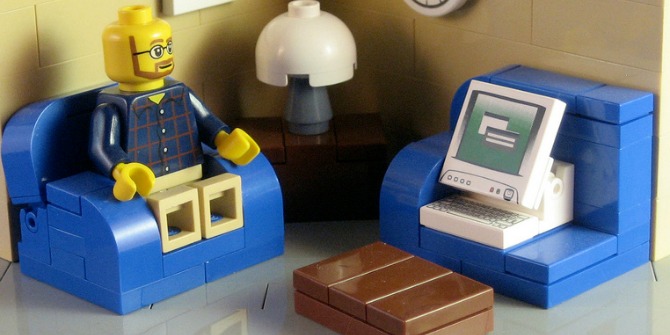 The publishing system may be built into the DNA of academia, but academics can still make a change by putting pressure on publishers to kick back some profit to the very people who make research happen. Adding to the debate, Inger Mewburn talks the ethics of publishing, the costs to libraries, and why publishers need to be a bit more creative.
The publishing system may be built into the DNA of academia, but academics can still make a change by putting pressure on publishers to kick back some profit to the very people who make research happen. Adding to the debate, Inger Mewburn talks the ethics of publishing, the costs to libraries, and why publishers need to be a bit more creative.
I have spent years exhorting students to publish as much as possible before they finish and straight after. But lately I am beginning to wonder about my place in the academic publishing system, both as a researcher and a teacher. I don’t think I can keep handing out this advice with a clear conscience.
The ethics of publishing
Academic publishing is presented as a universal good, without regard to how the publishing system operates. While publications are an essential addition to the CV in today’s competitive job market, the ethics of publishing need to be considered too. Some big publishers are making boatloads of money – in the order of millions of dollars – out of labour we academics willingly give them. This profit largely goes into the pockets of shareholders, not the researchers or universities.
Essentially this is public money which becomes ‘privatized’. It works a bit like this. Citizens are taxed and the government uses this tax to fund my university. My university pays me a wage to write papers, amongst other things. I give my papers, and the copyright to reproduce and distribute them, to an academic publisher. They publish my article in a big database and make it searchable. If I want to be a good academic citizen I also do peer reviews for these journals, thus helping to ensure the quality of the publishing system as a whole.
Of course, I am a user as well as a content provider. My university (with more tax payer’s money) pays the journal publishers to let me search their databases and download articles. This is where it gets sticky.
Bundling: at what cost to libraries?
Some journal publishers engage in questionable practices in how they sell the content we produce back to us. You may have heard of the term ‘bundling’. Basically bundling works a bit like a cable television subscription. I like to watch the Lifestyle channel, but Thesis Whisperer Jnr likes the Discovery channel. My cable company is well aware of this and only sells ‘bundles’, not individual channels. I would like to buy a custom bundle with Lifestyle and Discovery, but instead I am forced to buy two bundles in order to get both the channels I want.
Libraries have been facing increasing costs because of these bundling practices and the problem is worse in the developing world. I have had emails from people in Africa and some parts of Asia asking for a copy of an article because their universities have had to cut costs. According to my publishing agreement I would be breaking the law to send it to them – this sticks in my throat, especially after my recent visit to Vietnam.
Unfortunately the academic publishing system is built into the DNA of academia. As the QED insight blog argued recently, the university needs publishers to help them weigh up my merits as a researcher. If I publish in good quality journals they have a way of judging my quality as an academic. I am cutting my nose off to spite my face if I refuse to participate – I will not get promoted and I may even lose my job.
Journal publishers argue they provide value. Maintaining large database systems and editing our papers is not cost free. True. Everyone has the right, I believe, to be paid for his or her work, but the argument can easily run the other way. Journal publishers pay their shareholders, their editors, administrators and software engineers – so where’s my cut as content provider and expert consultant?
The Elsevier boycott continues to grow
Some academics have become so incensed at what they see as the inequities of this system they have signed the Cost of Knowledge petition declaring they will boycott the journal publisher Elsevier. Elsevier are not the only journal to be accused of questionable practices, but they have copped the brunt of the academic anger.
This petition is the academic equivalent of the Hollywood writers strike. I think it could work so, after some hesitation, I signed it. It’s not, of course, the whole answer, especially when it only targets one publisher, but it’s the only way I can send a message loud enough to be heard. But I have to be honest with you: I only signed because the effect on me personally is slight. Elsevier publishes very few education journals. Would I have signed a similar petition against Taylor and Francis? I’m not sure. Those of us earlier in our careers have much more to lose being political.
Publishers seem blissfully unaware of the challenge to their business model posed by social media and easy, free publishing tools. If I wanted to I could start my own peer reviewed journal tomorrow. I have the tools and the contacts, just not the time. Recently, in a public forum, I challenged a member of the Elsevier board to tell me how the company is responding to changes in the publishing landscape. He told me they are thinking about it, and in the meantime they were generously providing, free of charge, a guide to publishing in journals for first timers. Wonderful, but how about some more tangible sign of your appreciation for our work?
If pop stars get paid, why can’t I?
I think we academics need to start learning from other creatives, like the music industry. Most pop stars get paid ludicrously small amounts for their creative work it’s true, but they do get paid something. I have no objection to journals making some money and providing work for editors and other talented people. We don’t have to throw the baby out with the bath water, but we could pressure the publishers to kick back some of that profit to the people who make research happen and advance human knowledge. Us.
So Elsevier, I will start publishing with you when you start sharing the love. I have some ideas for what you can do.
Let’s start with simple profit sharing. For instance, you could pay my institution a nominal amount per download. Perfect capitalist solution: the more popular my papers get, the more my institution benefits and they can reward me with a promotion. Or you could pay me directly for each download of my work and I could use that money to buy out teaching time and buy in research assistants.
If you don’t want to pay me or my institution, you could show me that you are a good corporate citizen in other ways. How about ‘angel investing’ in cutting edge research? You could even benefit by IP arrangements.
Or you could think about providing some grant money from your profits which content providers like myself could bid for on a competitive basis.
Elsevier – you could benefit by being generous – if you play this right you could get the first pick of all the best work because I would have an incentive to choose you.
At the time of writing the petition had 6268 signatures. How many will it take to make changes happen? I doubt many early career researchers or students will find themselves in a position to sign right now – I’m not judging. Whatever gets you through the night. I do, however, applaud the senior members of our community who are providing leadership and showing the way. If enough of you with little to lose sign, those of us at the bottom of the academic pecking order might feel more confident to pile on.
It seems to me that journal publishers need to be a bit more creative – or they will die. I think this is a pity because most journals provide an excellent service for academia and I’m not sure we academics have the resources to replace them.
This post originally appeared on Inger’s blog: The Thesis Whisperer







